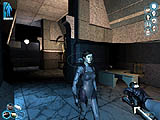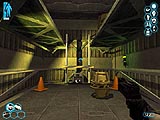
| Publisher: Ion Storm | Developer: Eidos Interactive |
| Previewer: Sarcasmorator | Expected Release: 2003 |
|
In 1999, Ion Storm released a first-person shooter that far transcended the traditional boundaries of the genre. Mixing a customizable main character with an engaging and complex storyline, Warren Spector and co. had managed to bring depth to a previously mindless genre. Deus Ex gave players an incredible amount of freedom as literally every obstacle could be overcome in several different ways depending on the player’s preference. From brute force to stealth, Deus Ex allowed players to tackle every situation in whatever manner suited them. By offering character development similar to classic role-playing games in addition to open-ended gameplay, Deus Ex was revolutionary. Though, with the recent PlayStation 2 re-release, the game was beginning to show its age. Now, after 3 years, Ion Storm and Warren Spector are developing the sequel for release on PC and Xbox next year. Set 20 years after the events of Deus Ex, players take the role of the androgynously named agent “Alex” (players may chose either genders), cloned from the protagonists of the first game: Paul and JC Denton. ”Alex” is one of several attempts made by a mysterious faction attempting to recreate the success of the originals. In keeping with his/her lineage, “Alex” is an augmented super agent, given enhanced powers by nano-machines in his/her body which operate using their host’s biological energy. These abilities include increased speed and jumping capabilities, enhanced strength, and improved vision and lung capacity. Some of the more exotic blandishments available to “Alex” are optical and radar camouflage, healing, and protection from attacks. Most of the augmentations return from the first game, though there will be some new additions as well, easing the tweak-heavy skill system of the first game. New to the series are black market bio-modifications which operate quite differently than legitimate ones. For example, a legal augmentation would heal you directly, though the black market edition would require energy leeched from corpses. Deus Ex 2 also sports significantly improved visuals. Running on a heavily modified version of the Unreal Warfare engine, the Invisible War is significantly more attractive than its predecessor. The increased visual acumen also features realistic dynamic lighting and shadows. This will directly impact gameplay, making stealth more realistic, important, and difficult. Also improved are the game’s physics; objects are made to move as they would in the real world when knocked over, thrown or shot. Plot details are still vague at this point, though the adventure will take Alex from Seattle to Germany, through Antarctica and into Cairo among other locations. Dues Ex purists concerned with continuity will be pleased to know that both JC and Paul Denton will have cameo appearances in the sequel. Though Deus Ex 2 will have fewer areas than the original, these areas will be larger with more to do in them. The artificial intelligence has also been improved with NPCs programmed to check out any alterations in their environment. From noise to lighting changes, even a startled cat running by, enemies will react accordingly. Their responses will be affected by, and occasionally dependent on, the presence of other NPCs. The prodigal amount of dialogue from the original has been increased as well, jumping from approximately 10,000 lines to 30,000. With open-ended play structure, in-depth character development and twisted narrative, Deus Ex set a new high-water mark for role-playing shooters. Deus Ex 2: The Invisible War looks to take the ambition of the first title even further. |
|


